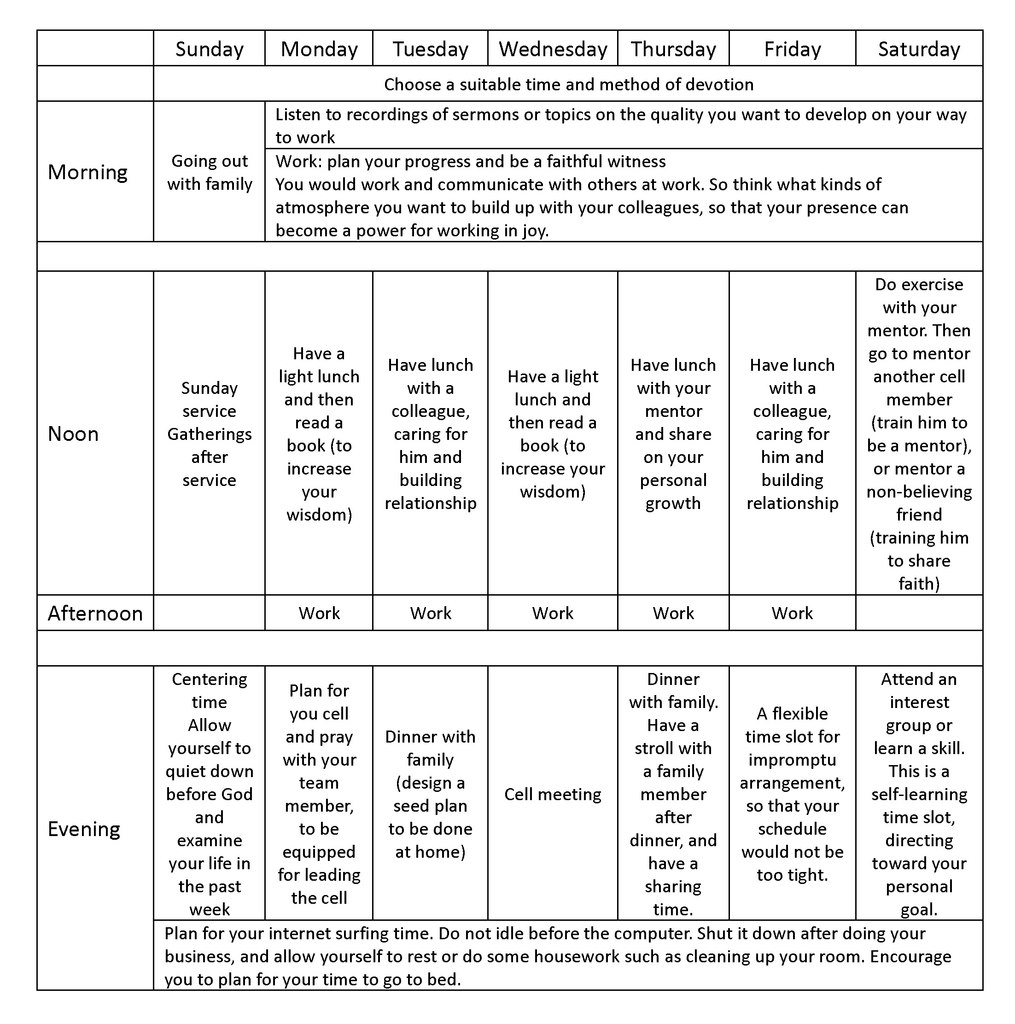Time Management
God has bestowed you a very great gift, which is 24 hours a day, 7 days a week, and 52 weeks a year, adding up to 8,736 hours annually. Have you ever calculated how many minutes you have in your whole life? 8,763 hours x 60 minutes = 524,160 minutes. If you have 70 years of life, and 524,160 minutes a year, then for your whole life, you have 524,160 minutes x 70 years = 36,691,200 minutes!
Oh! That is an abundant grace, and everybody can have it!
But why is it that every life would bear different fruit? Some lives are fruitless, while others are miraculous! The key is how you would use every moments of life that God has given you. If you have a fantastic vision, but do not have a good plan to work it out, then it would be a waste, and at the end you can get nothing!
If you want to learn time management, jot down all the things that you have done in the past week into the appropriate boxes of the following table, and write down the time that you have spent on each.
| Important/Not Urgent e.g. devotion (15 min) |
Important/Urgent
|
| Not important/Not Urgent e.g. idling in front of TV(30 hours) |
Not important/Urgent
|
What have you discovered in what you have filled in? Most people would spend the least time on important but not urgent matters. But if you want to achieve your personal vision, the amount of time you spend on important but not urgent matters will determine your success, because this shows how much you value developing yourself so as to attain the vision given to you.
How you use your time reflects what habits you are developing, and your habits will determine your life.
Looking from another angle, your life-goal will determine your value, and your value will determine your characters, and your characters will determine how you would use your time. Looking reversely, how you use your time is crucial in achieving your life-goal. Therefore you can begin trying to draft your weekly timetable, and "purposely" arrange what you have to do into a 7-day schedule, so that you can follow the plan and do what you should do and plan to do. I am trying to draft a timetable of a working young man for your reference.

At first you may not be used to it, and you may ask your mentor to help you draft your schedule and monitor you on working it out. Give yourself sufficient encouragement and work on it one step at a time. Do not be frustrated when there are times you cannot work it out. Adjustments may be necessary on your arrangements and expectations. It is better to plan at the beginning of each week, but there should always be flexibility. Timetable is to serve you, not to enslave you. The most important thing is that it can help you achieve your expectations.
You will discover that in the week you planned you have a better quality of your use of time.
The cumulative effect of your use of time each day determines the outcome of your week.
The cumulative effect of your use of time each week determines the result of your month.
The cumulative effect of your use of time each month determines your growth in a year.
The cumulative effect of your use of time each year determines your accomplishment in a decade.
The cumulative effect of your use of time each decade determines the fruit your bear in your life.
Of course, encourage you to review your plan each week whether you are working according to schedule. If you action is far behind your plan, say achieving only 50%, you should reflect on the reasons. If the plan too ambitious? Or are you too loose to yourself? Plan for the following week after review, and you can plan better and manage your time better. And you can manage your life better in focusing on the important things.